Have you found yourself spending more time outdoors during the COVID-19 pandemic? If so, chances are you may have walked past one of Richmond’s many community gardens, which are managed by the Richmond Food Security Society (RFSS).
Richmond Food Security Society is a not-for-profit society that was founded in 2002 as a Food Security Task Force by the Richmond Poverty Response Committee. In addition to shaping food policy development for the municipality, one of the Society’s key aims is to educate the general public about local agriculture, as well as explore health, sustainability, and social justice issues in relation to food. A part of their portfolio also includes managing the municipality’s public garden plots and running programs such as the fruit gleaning initiative to provide locally grown food to families in need.
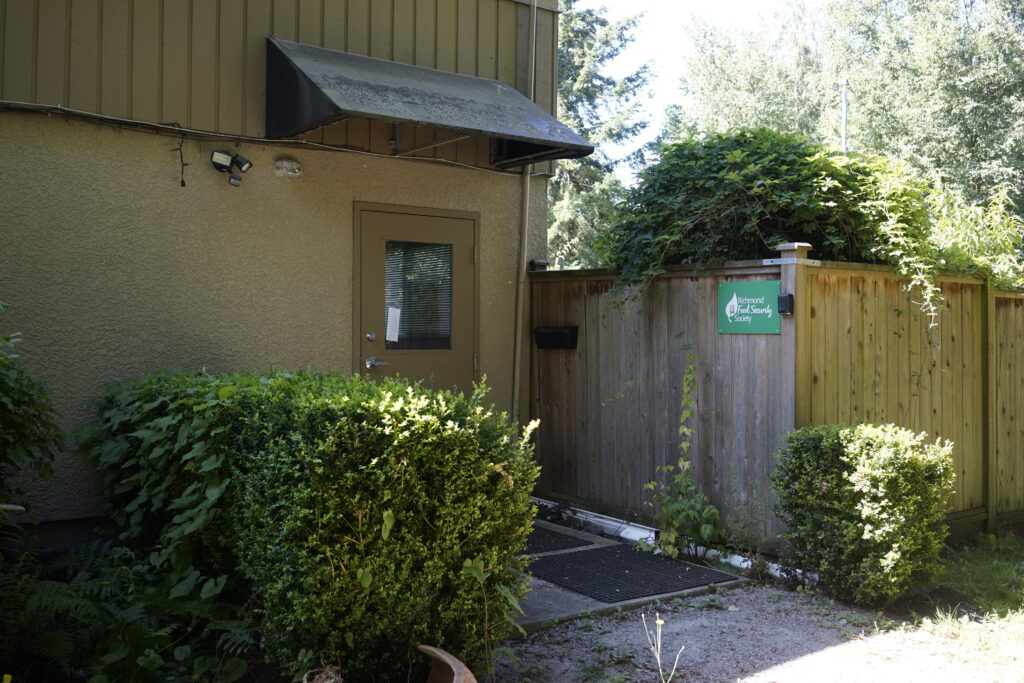
During Summer 2020, Richmond Food Stories had the opportunity to interview Ian Lai, Executive Director of the Richmond Food Security Society, to learn more about his organization and his personal journey to becoming involved in food security issues. Originally from South Africa, Ian Lai moved to Canada in 1979. His parents ran a restaurant business in Johannesburg, so Ian grew up in the kitchen. Trained in French cuisine, he was a former chef at the Four Seasons Hotel and at the U.S. Consulate General, as well as a former co-owner of the Northwest Culinary Academy of Vancouver.
“I’ve been cooking since ‘79, always been in the restaurant business. As a cook, I always think about questions like ‘Where does this food come from?’ ‘How does this impact what I do?’ There’s a lot of negative energy in restaurant food because there’s so much time pressure to make something amazing, and then you eat that negative energy. By changing the way you see food, respecting it from its source, changes how the cook prepares that food, and how it is eventually served and eaten. If the cook appreciates where and how this food came from, then there is more mindfulness and respect put into the dish. So making sure that everyone understands the food system and cycle is super important.”
— Ian Lai, Executive Director of the Richmond Food Security Society
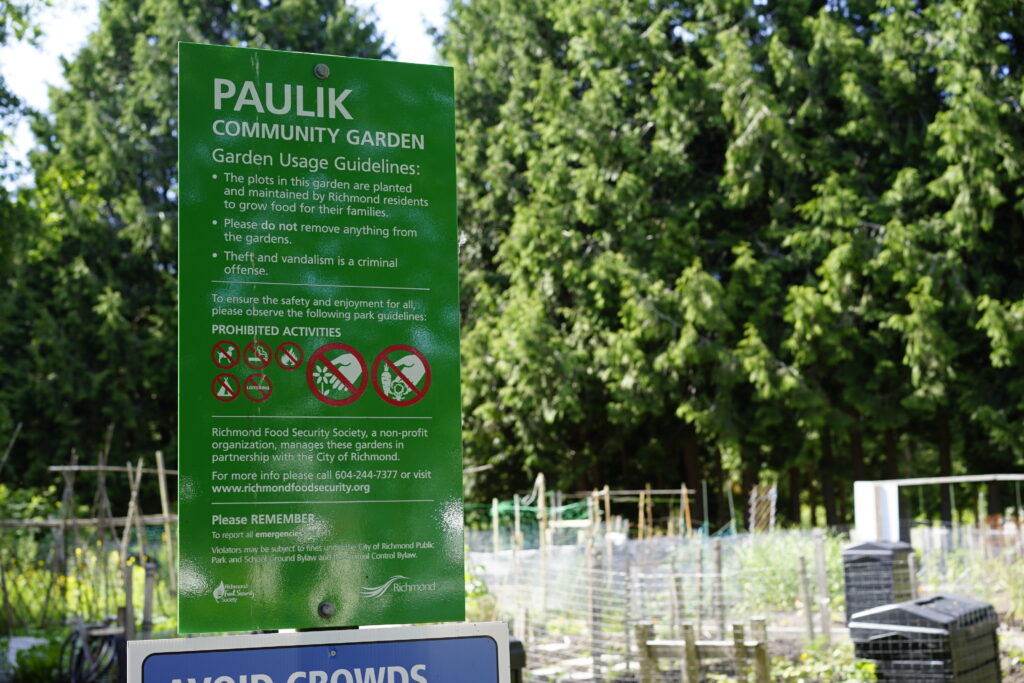
Q: What types of community educational programming does the RFSS offer?
A: We are a team of eight staff, which includes educators, chefs, and administrators. Before the pandemic, we ran a number of low-cost educational programs through our educational centre, local schools, as well as the public library. We also used to offer free in-person food skills workshops at the Steveston Cannery. In response to COVID, we have shifted all of our programming online. Most people have access digitally, and we keep the community engaged through our weekly Instagram and Facebook posts. We have a Vegucation series, with resources and education that teaches people how to get the most out of home gardening. During the beginning of the pandemic, many local seed companies and garden centres ran out of seeds. We shifted our Seed Library program online and provided contactless services for people picking up or dropping off seeds. COVID has given us a step up to promote food security in our own way through these individual programs that we deliver.
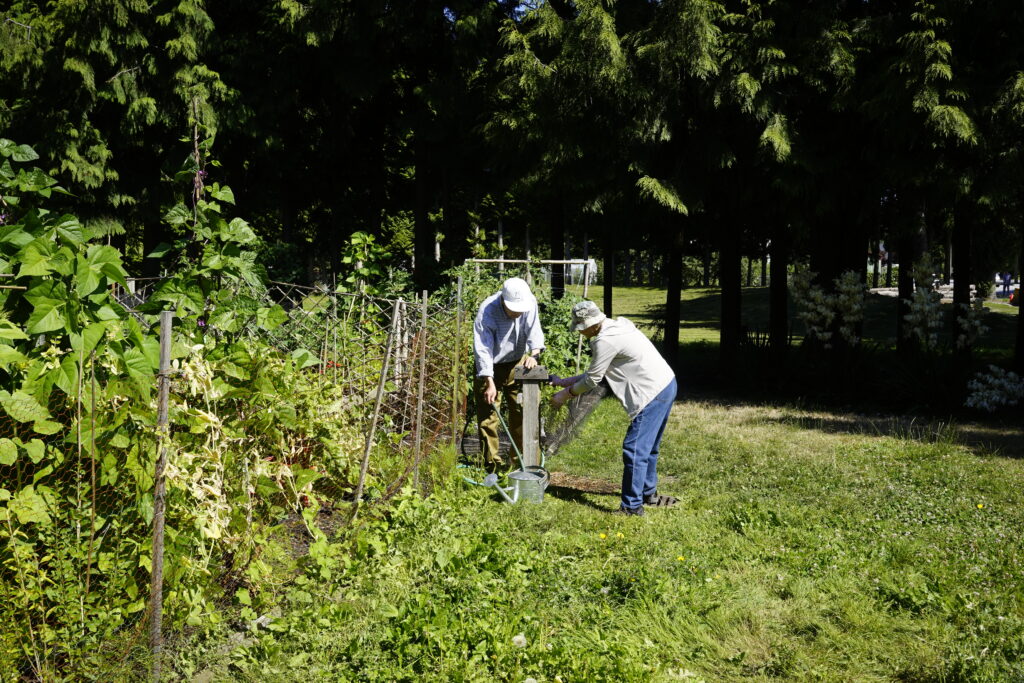
“We want Richmond residents to recognize that they are all a part of the local food system.”
— Ian Lai, Executive Director, RFSS
Q: Where can Richmond residents access food resources?
A: Before COVID, if you were in need of food, you could actually get a meal every single day.
In addition to accessing a grocery hamper through the Food Bank, there are also community meals and congregate meals. A lot of the faith-based organizations serve meals on a weekly, rotational basis. Right now, grocery hampers are pre-packaged for you. But before the pandemic, to make sure people had dignity around food, clients would be able to go to the Food Bank and select what they want out of each category.
Now with COVID, we are partnering with a number of social services organizations to deliver cooked meals. We have a team of four chefs that is preparing upwards of 500 meals per week to provide to families in need, as part of the Local Love Food Hub program. We also collaborated with the Richmond School District to deliver fresh produce to 250 students who were normally signed up for meal programs when school was in session.
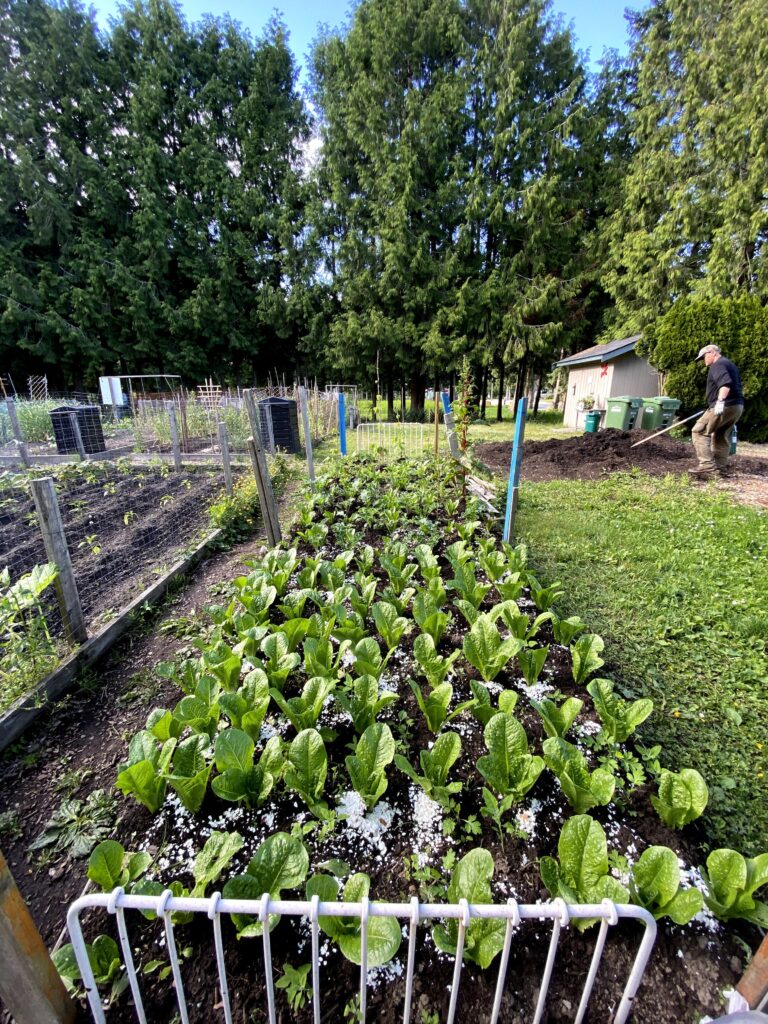
Q: The Richmond Community Food Asset Map has gathered over 40,000 views to date. What was the inspiration behind the development of this project?
A: The online food asset map is an extension of the City of Vancouver’s food asset map initiative. A lot of social agencies use it to guide clients or members to different places for meals and access to food. The Richmond Food Security Society, in collaboration with Vancouver Coastal Health, led the initial creation of our Richmond food asset map several years ago, with the support of UBC students during the early stages of development. The map featured information about local businesses, farms, as well as information on community meal programs, faith-based meal programs, and congregate meal programs. Unfortunately during COVID, a lot of those programs have had to shut down. The map was updated in 2020 to ensure that residents knew where to find food during the pandemic.
“We all serve Richmond, and together we make it stronger.”
— Ian Lai, Executive Director, RFSS
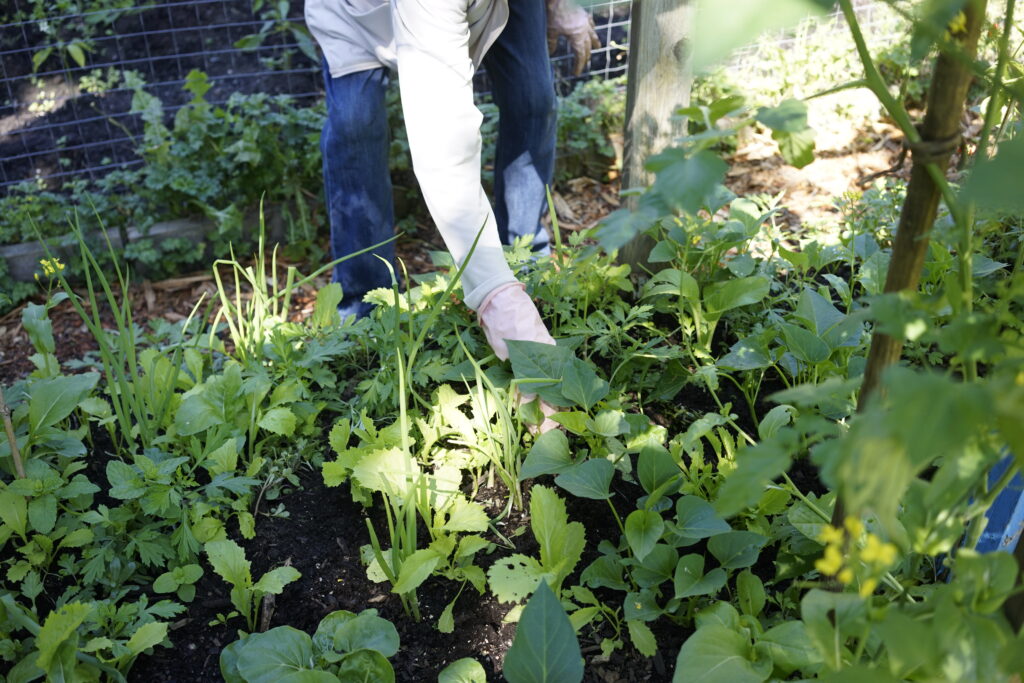
Q: How do Richmond’s community gardens work?
A: The community gardens are for Richmond residents. For residents in need, they can apply for a subsidy to cover the plot fee. We also allocate community plots for Vancouver Coastal Health, Richmond Food Bank, and mental health organizations, who provide gardening space for their teams or clients to use. With our partners, we also co-organize events, share space, and help cross-promote our work initiatives.
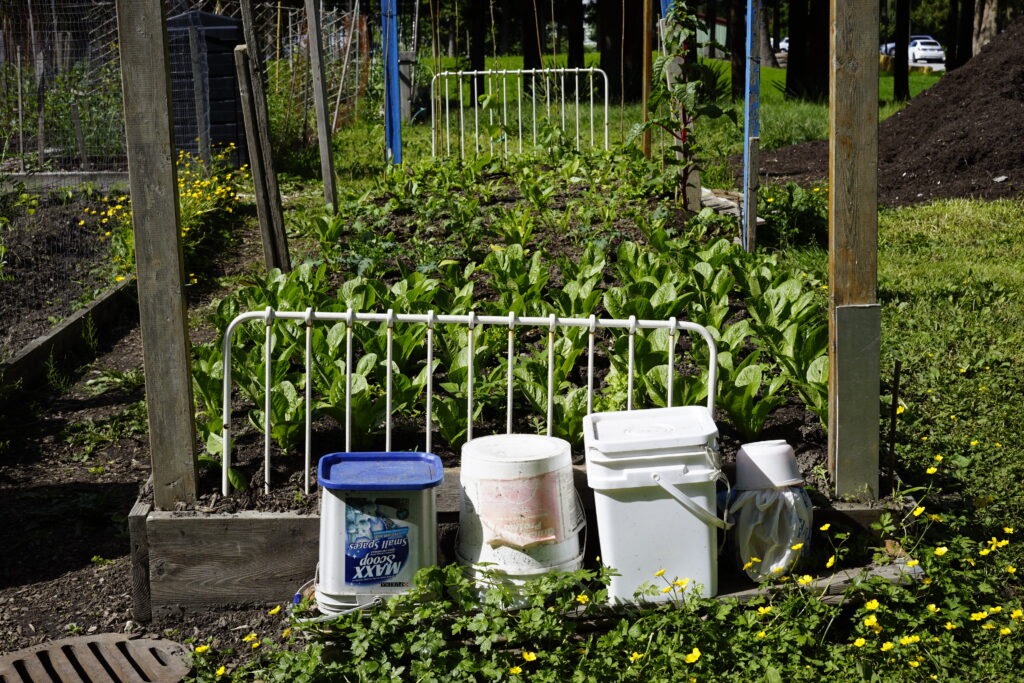
Q: How are some challenges you see in relation to newcomers and food insecurity?
A: As much as we would like to shift new immigrants to the continuum of food sustainability and healthy access to food, a lot of newcomers and single parents cannot spend the time in a community garden. Realistically, their priority is settling in with stable housing, employment and education for their children. They may have more than one job, on top of providing care to their family members. The reality is that people who are just establishing themselves, leisure time to grow their own food is not on the radar. Most community gardens are also not located near a bus line so if you don’t own a vehicle, this becomes a barrier. As much as community gardens bring about social integration and a reduction in isolation, new immigrants may not view community gardens as their first priority .
“We don’t expect to see change overnight. It’s slow, incremental steps on that continuum to food independence. Food insecurity is directly related to income. It is based around how much someone is making or not making. The livable wage is a key determinant in food access. So it’s not the fact that there isn’t food around, it’s that your income level restricts what you are able to do in order to access that food.”
— Ian Lai, Executive Director, RFSS
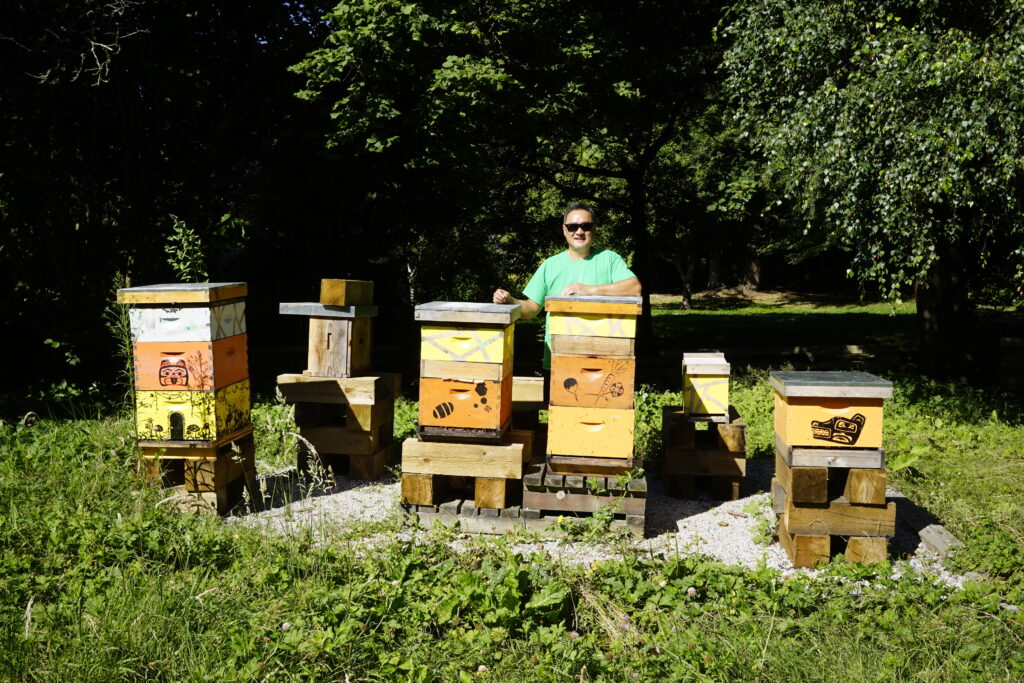
Q: Can you tell us something about bee hives you have here?
A: There’s a lot of negative impressions about bees — they sting, the swarms are dangerous. So here we invite the public to engage in hive inspections and participate in a variety of educational programming, such as the successful youth bee program we ran in 2019. This is all part of food security as well. The boxes painted with First Nations designs is our way of giving reverence to the Indigenous peoples whose land we now live and work on. We need to recognize that we are simply tenants of this land and we are simply passing through. As a beekeeper, this is my way of paying respect to the First Peoples that live here.
Ian Lai is a chef educator, beekeeper, yogi and rock climber. He lives in Richmond with his wife and daughter. To learn more about Ian’s personal journey and work on food security, see the following articles in the Richmond News, Tourism Richmond, and Alive.
The Richmond Food Security Society has worked closely with local social services agencies such as the Richmond Society for Community Living and local businesses such as Bánh Mì Très Bon to bring food to the table for many of Richmond local residents. Follow the links below to read the related stories.









